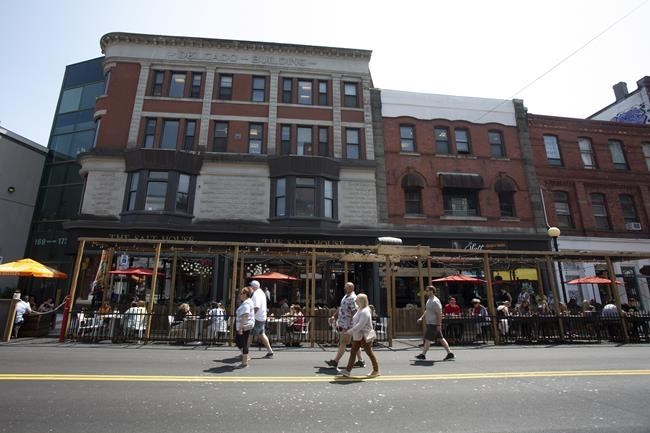OTTAWA — The annual pace of inflation rose to 3.7 per cent in July, Statistics Canada says, marking the biggest increase since May 2011 as price growth accelerated across much of the consumer price index and in all provinces.
The year-over-year increase in the consumer price index compared with a 3.1 per cent increase in June as more of parts of the economy reopened, giving consumers more opportunities to spend.
Statistics Canada said part of the year-over-year rise is due to comparing prices to the lows seen one year ago.
Gasoline prices, for instance, rose by 30.9 per cent compared with July 2020 when many businesses and services started to reopen after the first wave of COVID-19. Excluding gasoline, the consumer price index for July increased 2.8 per cent compared with a year ago.
Prices for goods rose at an annual rate of five per cent in July, accelerating from the 4.5 per cent recorded in June. Car costs were up 5.5 per cent, which the agency said was partially because of a global shortage of semiconductor chips.
But other parts of the index were up because prices have increased at restaurants, for travel and tourism as companies pass on extra costs and respond to a surge in demand.
CIBC senior economist Royce Mendes said elevated inflation readings could stick around into next year with supply chain issues possibly persisting, and the Delta variant of COVID-19 posing a challenge to the economic reopening.
The largest driver of overall price growth stemmed from the country's housing market, as homeowner replacement costs rose 13.8 per cent year-over-year, the largest increase since October 1987.
Food prices increased by 1.7 per cent in July compared with July 2020, with Statistics Canada noting prices for food purchased at restaurants grew by 3.1 per cent, the largest increase since January 2019.
The headline reading for inflation marked the fourth straight month that the consumer price index registered a reading above three per cent, which turned it into a political talking point on the federal campaign trail.
Regionally, prices increases at a faster pace in July than June in all provinces, led by Prince Edward Island which registered a year-over-year increase of 6.1 per cent.
The Bank of Canada has warned that inflation is likely to hover around three per cent this year, above its two-per-cent comfort zone.
"What we need to keep in mind is that this is not the type of inflation that the Bank of Canada is looking for, which would be driven by a fully healthy economy," Mendes said in an interview.
"There are still almost half a million people out of work that we need to get back to work before we can say that interest rates need to rise, or we need to pull back on stimulus in any meaningful way."
Statistics Canada says the average of Canada's three measures for core inflation, which are considered better gauges of underlying price pressures and closely tracked by the Bank of Canada, was 2.47 per cent in July, up from the 2.27 per cent recorded in June.
The last time the average was as high as it was in July was in March 2009.
RBC economist Claire Fan said she expected a recovery in household demand, particularly for spending on services, to put a floor under inflation trends into next year even as temporary disruptions in price growth fade.
Bank of Canada governor Tiff Macklem has said the central bank will act to cool inflation should temporary price pressures stick around and appear more permanent, which would include reducing its bond purchases or raising its key policy rate from 0.25 per cent.
"The staying power of inflation will ultimately depend on expectations and the response of monetary policy," TD senior economist James Marple wrote in a note.Â
"The Bank of Canada may be willing to tolerate higher inflation while the economy is still re-opening and recovering from the health shock, but it will respond to more lasting price pressures by reducing monetary accommodation."
This report by The Canadian Press was first published Aug. 18, 2021.
The Canadian Press

